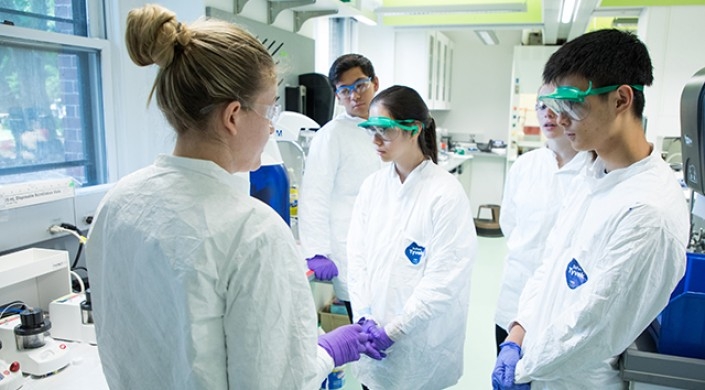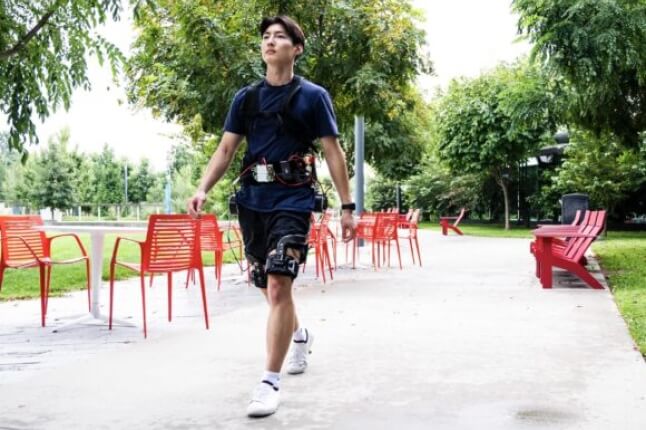News
(From left) Eden Tanner, Gabriel Serfaty, Angel Kuang, Madison Sklaver, and John Gyuchan Lee set up the microfluidics station for drug nanoparticle synthesis. (Photo by Colleen Anderson)
Twelve students from around the world were introduced to the fundamentals of bioengineering this summer, conducting research into some of the biggest quandaries in this burgeoning field.
The young researchers participated in BioSTAR, a two-week bioengineering summer program run by the Active Learning Labs at the Harvard John A. Paulson School of Engineering and Applied Sciences (SEAS).
During the first week of the program, students worked with mouse cancer cells to learn about anti-cancer drug development, research, and treatment. Beyond learning basic tissue culture techniques, students were able to witness firsthand the importance of 3D cultures for drug development by growing cells in both 2D and 3D. The second week focused on bacteria and the challenge of tackling antibiotic resistance.
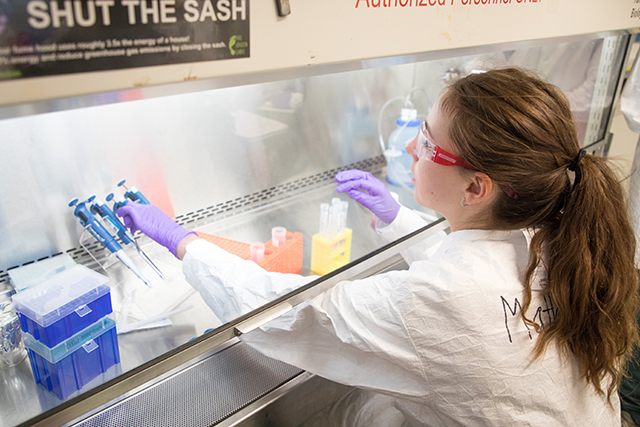
Student Mathilda Hoerstrup works in the laminar flow hood to culture mammalian cells. (Photo by Colleen Anderson)
The BioSTAR program was initiated by Samir Mitragotri, Hiller Professor of Bioengineering, and Wyss Professor of Biologically Inspired Engineering at SEAS, and co-directed by Melissa Hancock, Biological and Environmental Lab Engineer in the Active Learning Labs, and Eden Tanner, Postdoctoral Fellow in Bioengineering.
“Students gained hands-on experience culturing bacteria as biofilm and treating the cultures with silver nanoparticles to enhance susceptibility to antibiotics,” explained Hancock.
Students were exposed to a multitude of bioengineering topics and research from numerous faculty and staff, including Adam Graham, Senior Scientist at the Center for Nanoscale Systems, Stefan Kolle, a Ph.D. candidate in engineering sciences, Qiang Li, postdoctoral fellow in bioengineering, Linsey Moyer, Assistant Director of Undergraduate Studies in Biomedical Engineering, Kevin “Kit” Parker, Tarr Family Professor of Bioengineering and Applied Physics, Brian Polizzotti, Assistant Professor of Pediatrics at Harvard Medical School, Michelle Rosen, Lecturer in Mechanical Engineering Design, and Dmitry Shvartsman, Senior Researcher in the Department of Stem Cell and Regenerative Biology.The immersive program provided a strong foundation in bioengineering and allowed the students to work with some of the most sophisticated technologies in the field.
Rising high school junior Angel Kuang was excited to use a scanning electron microscope.
“I loved working hands-on on the materials that we had because we had a scanning electron microscope that we were able to utilize. It's a million-dollar technology,” she explained. “We are learning [about] cutting-edge technology that we can actually apply later to our careers.”
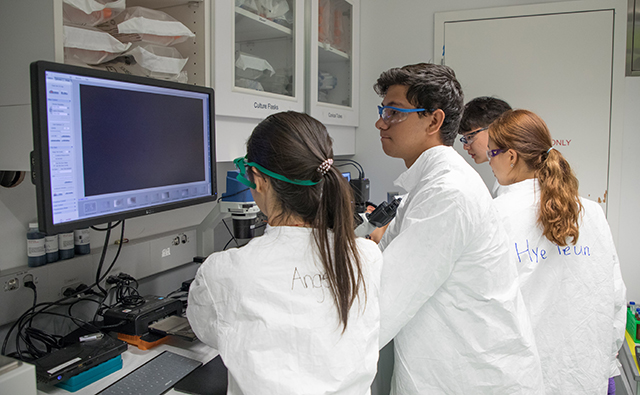
Angel Kuang, Gabriel Serfaty, Hye Yeun Chu, and Geunil Yi image mammalian cell cultures after treatment with an anti-cancer drug. (Photo by Colleen Anderson)
A common thread among the students was their surprise at how advanced the program was, and that they were tackling problems and using technology that is on the cutting-edge of bioengineering research.
Cordelia Yu, a rising high school senior, said that they learned so many new concepts it was difficult to choose her favorite.
“There are a lot of things that we have learned and I thought that the most interesting is how nanotechnology is able to play such a huge role in terms of penetrating cancer cells which allows a more effective drug delivery method and I just think that technology has got huge potential for future cures,” she said.
Student Adam Boesky was fascinated to learn how Harvard faculty members are using nanoparticles to make more targeted medicines.
“I think we are definitely doing a very high level of bioengineering,” said Boesky. “They are trying to get us to be up at that level and that’s probably the hardest part, conceptualizing everything that we are doing and understanding the actual processes of what’s happening.”
Rising to the challenge, students went from struggling to use a mirco-pipet to having hands-on experience with mammalian cell culture, microfluidics, nanoparticle synthesis, horizontal gene transfer, fluorescence confocal microscopy, scanning electron microscopy, and microplate reader viability assays.
“Before this [program], I was like ‘No way am I doing bioengineering,’” said Gabriel Serftay. “But this has definitely shed new light on the fact that there are a million opportunities and possibilities.”
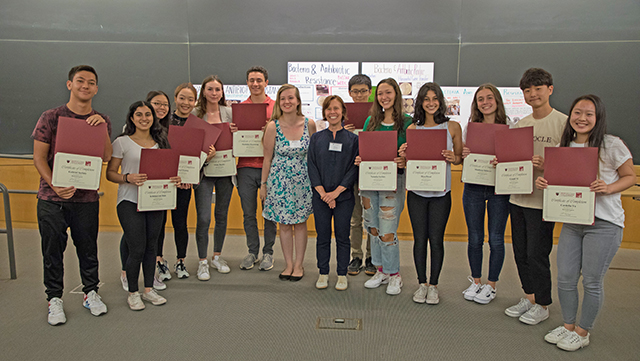
The students display their program certificates after their final presentations. (From left) Gabriel Serfaty, Krishnaveni Dole, Angel Kuang, Hye Yeun Chu, Mathilda Hoerstrup, Adam Boesky, Eden Tanner, Melissa Hancock, John Gyuchan Lee, Natasha Serfaty, Diya Desai, Madison Sklaver, Geunil Yi, and Cordelia Yu. (Photo by Colleen Anderson)
Topics: Bioengineering
Cutting-edge science delivered direct to your inbox.
Join the Harvard SEAS mailing list.
Press Contact
Adam Zewe | 617-496-5878 | azewe@seas.harvard.edu
